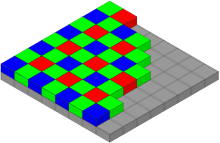User:ScotXW/webcam
wapcamp

A webcam is a video camera that feeds or streams its image in real time to or through a computer to a computer network.
The term "webcam" (a clipped compound) may also be used in its original sense of a video camera connected to the Web continuously for an indefinite time, rather than for a particular session, generally supplying a view for anyone who visits its web page over the Internet. Some of them, for example, those used as online traffic cameras, are expensive, rugged professional video cameras.
Optics[edit]

Various lenses are available, the most common in consumer-grade webcams being a plastic lens that can be manually moved in and out to focus the camera. Fixed-focus lenses, which have no provision for adjustment, are also available. As a camera system's depth of field is greater for small image formats and is greater for lenses with a large f-number (small aperture), the systems used in webcams have a sufficiently large depth of field that the use of a fixed-focus lens does not impact image sharpness to a great extent.
Most models use simple, focal-free optics (fixed focus, factory-set for the usual distance from the monitor to which it is fastened to the user) or manual focus.
Image sensor[edit]

Image sensors can be CMOS or CCD, the former being dominant for low-cost cameras.
Most consumer webcams are capable of providing VGA-resolution video at a frame rate of 30 frames per second. Many newer devices can produce video in multi-megapixel resolutions, and a few can run at high frame rates such as the PlayStation Eye, which can produce 320×240 video at 120 frames per second. The Wii Remote contains an image sensor with a resolution of 1024×768 pixels.
Bayer filter[edit]


As the bayer filter is proprietary, any webcam contains some built-in image processing, separate from compression.
Some minimal image processing is required to get RGB values for all pixels.
Raw image format[edit]
It is only after the bayer interpolation, that we talk about the raw image format.
Compression[edit]
Digital video streams are represented by huge amounts of data, burdening its transmission (from the image sensor, where the data is continuously created) and storage alike.
Most if not all cheap webcams come with built-it ASIC to do video compression in real-time.
Support electronics read the image from the sensor and transmit it to the host computer. The camera pictured to the right, for example, uses a Sonix SN9C101 to transmit its image over USB. Typically, each frame is transmitted uncompressed in RGB or YUV or compressed as JPEG. Some cameras, such as mobile-phone cameras, use a CMOS sensor with supporting electronics "on die", i.e. the sensor and the support electronics are built on a single silicon chip to save space and manufacturing costs. Most webcams feature built-in microphones to make video calling and videoconferencing more convenient.
Interface[edit]
Typical interfaces used by articles marketed as a "webcam" are USB, Ethernet and IEEE 802.11 (denominated as IP camera). Further interfaces such as e.g. Composite video or S-Video are also available.
The USB video device class (UVC) specification allows inter-connectivity of webcams to computers without the need for proprietary device drivers.
Software[edit]
Various proprietary as well as free and open-source software is available to handle the UVC stream. One could use Guvcview or GStreamer and GStreamer-based software to handle the UVC stream.

